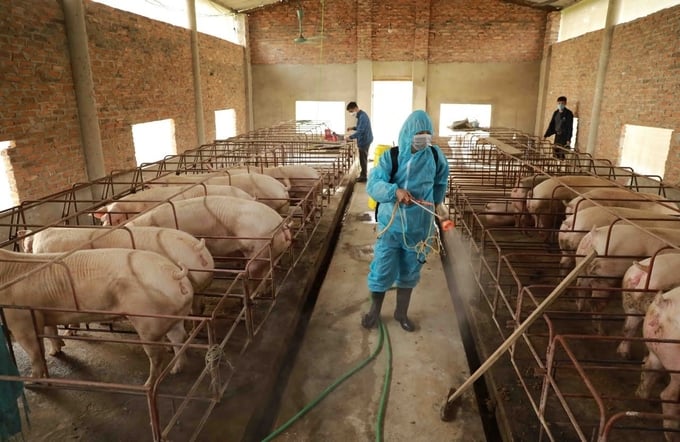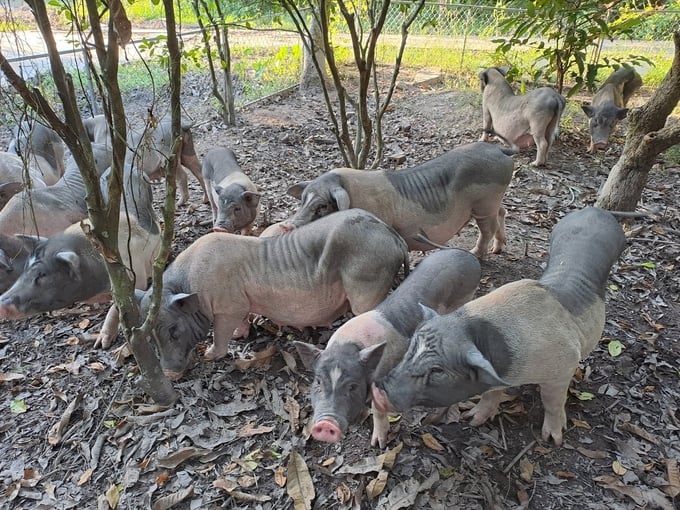November 22, 2025 | 12:49 GMT +7
November 22, 2025 | 12:49 GMT +7
Hotline: 0913.378.918
November 22, 2025 | 12:49 GMT +7
Hotline: 0913.378.918

The functional units are conducting pesticide spraying and disinfection of livestock farms. Photo: Nguyen Thanh.
African swine fever exhibits a quick spread and impacts pigs of all types and ages, resulting in an almost complete fatality rate. The virus responsible for the sickness can be found in the blood, organs, and secretions of pigs that are affected. It exhibits a high level of resistance, capable of enduring low temperatures, and can persist in raw pork or at moderate temperatures for 3-6 months, but turns dead at a temperature of 70 degrees Celsius.
Given its significant resistance, the virus can spread extensively and persistently across a broad geographical region, utilizing many transmission pathways that are challenging to manage, and there is yet no viable remedy. When the presence of infected pigs is identified, it is imperative to comprehensively tackle the outbreak in a limited, confined region prior to its dissemination.
At present, the Ministry of Agriculture and Rural Development recommends a vaccine for disease prevention in pigs intended for meat production. However, it is crucial to administer the vaccine under stringent supervision. In 2023, multiple provinces carried out experimental vaccinations and are currently assessing their efficacy.
"We regularly apply lime and disinfect the barns bi-monthly, monitor the feed, and subject the pig's food to cooking prior to feeding. Furthermore, cooperative members are taking measures to restrict movement to infected areas and prevent outsiders from entering the barns in order to safeguard the livestock during the widespread outbreak," Ms. Lien emphasized.

The Mong Cai pigs of Van Thinh Phat Cooperative are raised according to strict disease prevention procedures. Photo: Nguyen Thanh.
Directive No. 2080, issued by the Provincial Party Committee and the Provincial People's Committee, addresses the prevention, control, and management of African swine disease within the province.
Hence, departments, agencies, localities, organizations, and pig farming households must prioritize the prevention and control of African swine fever. This becomes particularly crucial during unpredictable weather fluctuations that compromise the livestock's immunity, thereby facilitating the growth of pathogens.
Localities must gather materials and chemicals and use all available resources to promptly execute measures to control the pandemic. The objective is to promptly isolate and eliminate outbreaks, effectively manage the situation, preempt the occurrence of subsequent outbreaks, and completely prevent broad transmission. Arrangements should be put in place to promptly recommence pig husbandry once the disease is effectively managed.
A combined quantity of 4,770 liters of chemicals and 29 tons of lime powder has been allocated and employed for the purpose of disinfection and environmental sanitation. This measure aims to restrict the occurrence and transmission of disease-causing agents in farming households, animal markets, and slaughterhouses, as well as to manage any outbreaks that may arise.
In order to manage and confine the outbreak, the Department of Agriculture and Rural Development consistently provides reports and recommendations to the Provincial People's Committee, urging local authorities to promptly allocate manpower and resources to control and confine African swine fever.
The authorities are enhancing the scrutiny and regulation of vehicles that transport animals, with a particular focus on those carrying pigs. They are also taking harsh measures to address any infractions. The current focus is on teaching and providing guidance to homes and farms on how to effectively close their barns, control potential sources of the African swine fever virus, and improve the implementation of biosecurity measures.
In addition, it is advisable for farming households to regularly employ lime powder and chemicals for disinfection purposes, not only within pig farms but also in the surrounding high-risk areas. It is important to sanitize individuals, transportation vehicles, and farming tools. Furthermore, it is recommended to refrain from importing breeding stock from infected regions and to avoid introducing new animals or restocking until the epidemic has been officially declared over. Additionally, it is advisable to minimize visits to farms and to avoid organizing direct meetings with farm owners and farmers to mitigate the risk of disease transmission to livestock areas.
As of June 9, 2024, the Department of Animal Health has reported that African swine fever has been detected in 392 communes and 148 districts across 40 provinces and cities. A total of 17,723 pigs have been euthanized, with the largest numbers in the provinces of Bac Kan, Lang Son, Son La, and Ba Ria-Vung Tau. As of June 9, 2024, there are now 199 ongoing epidemics in 199 communes/wards, 63 districts/towns/cities throughout 18 provinces/cities that have not yet exceeded 21 days.
Translated by Linh Linh

(VAN) Official Telegram No. 226/CD-TTg, issued on November 21, 2025, mandates enhanced management and utilization of national reserves to support flood response and relief efforts in the Central Region.

(VAN) The Politburo has demanded a high concentration of efforts on urgent relief tasks, ensuring absolute prevention of hunger, cold, and shortages of clean water or medicine among the population.

(VAN) Water resources during the 2025–2026 dry season in the Mekong River Basin basically meet domestic use and production needs, but localized shortages may still occur due to saltwater intrusion.

(VAN) Vietnam and Japan have committed to deepening cooperation on projects under the Joint Crediting Mechanism (JCM), improving waste management, and advancing the circular economy.

(VAN) Digital transformation is becoming a core driver of proactive, precise, and safer management of dams and reservoirs nationwide.

(VAN) This assistance supports people who temporarily relocate or evacuate, as well as communities affected by major storms from late September to now.

(VAN) Viet Nam will host the 8th ASEAN Heritage Parks Conference, bringing together over 320 delegates and reaffirming its role in regional nature conservation.